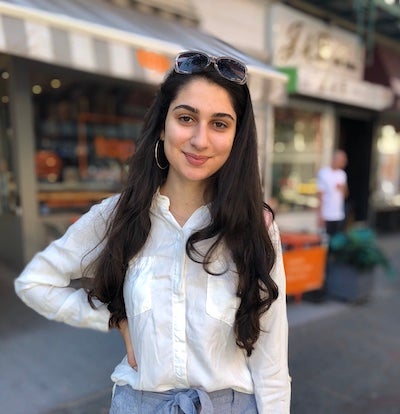Majors: Economics and French
Minors: Statistics and Mathematics
Hometown: Wakefield, RI
Q. What makes the College of Arts and Sciences at URI unique?
A. The College of Arts and Sciences at URI is unique in that, despite its large size, many classes are still small, intellectually stimulating, and highly interactive. Professors go to great lengths to lead instructive lectures and make themselves available outside of class, always welcoming engaged students. My positive classroom experiences encouraged me to broaden the scope of my education and accidentally discover some of the fields I enjoyed the most in college, such as statistics and political science. In fact, I’ve never felt the need to be shy when approaching faculty, having gotten some of my teaching assistant positions simply by asking—and learned so much as a result. Looking back, the emphasis in A&S on learning inside and outside the classroom has shaped me as an analytical thinker and has made me view the pursuit of knowledge as an ubiquitous endeavor.
What accomplishments and/or activities at URI are you most proud of now?
On the academic side, being elected to Phi Beta Kappa as a junior felt like a wonderful recognition of both the hard work I’ve put into my courses as well as my passion for the arts and sciences. Outside of academics, I knew I wanted to get involved with volunteer work from my freshman year and could not have found a better way to give back than through the URI Eating Concerns Advocates (UReca!) club. Although my specific role as secretary has involved sending (many) emails and making flyers, most of our work directly supports the National Eating Disorders Association. In fact, we had the privilege of hosting Rhode Island’s annual NEDA Walk on campus in 2018 and 2019. Over the semesters, we’ve organized numerous fundraisers, on-campus sales, and informative talks focused on increasing awareness and research/treatment funding for eating disorders and body image issues. Above all, I’m grateful to have met such an amazing group of individuals on campus passionately dedicated to this cause.
What research projects, internships, experiential learning, and/or study abroad programs did you participate in at URI? How did they enhance your education?
I’ve always felt somewhat drawn to teaching, leading me to a position as a tutor at the Academic Enhancement Center my freshman year. What followed was a long string of formative teaching assistant experiences, each a bit different than the other. Last spring, I worked as TA for Dr. Ashlea Rundlett’s PSC 310 class, helping lead recitations focused on teaching students R programming for political science. I enjoyed that the experience felt connected to my other classes using statistical software but still challenged me to think on my feet.
This spring is the second semester I’m working as a TA for Professor Christopher Briggs’s section of ECN 201, and it’s remarkable to see how much my confidence and comfort with the material has grown since last year. I find myself more easily hosting lengthy review sessions, answering students’ questions on the spot, and even using my knowledge from other courses to inform my instruction. I owe the smooth experience to Professor Briggs’ hands-off but encouraging mentorship style, always valuing any feedback I offer on problem sets and even allowing me to teach a whole lecture myself last spring.
What do you value about your liberal arts education?
What I value the most about my liberal arts education is its diversity. In high school, I had varying interests in the social and natural sciences, as well as foreign language, but only figured out how to bridge them in college. Learning another language seemed attractive at first, having been raised in an English- and Arabic-speaking household, but it took several courses in French to realize a French major at URI encompasses more than just the language. My courses in film, literature, and oral expression spanned the culture, history, and societal issues of France, giving me valuable insight into the country even without studying abroad. My love for statistics also happened by chance. A required course for my major led to a minor in the subject, which has helped me immensely in empirical research projects, such as my honors thesis, and on my CV. Although my education has encompassed different disciplines, it all feels connected in a way, endowing me with useful skills as much as it has led me to explore areas I love.

